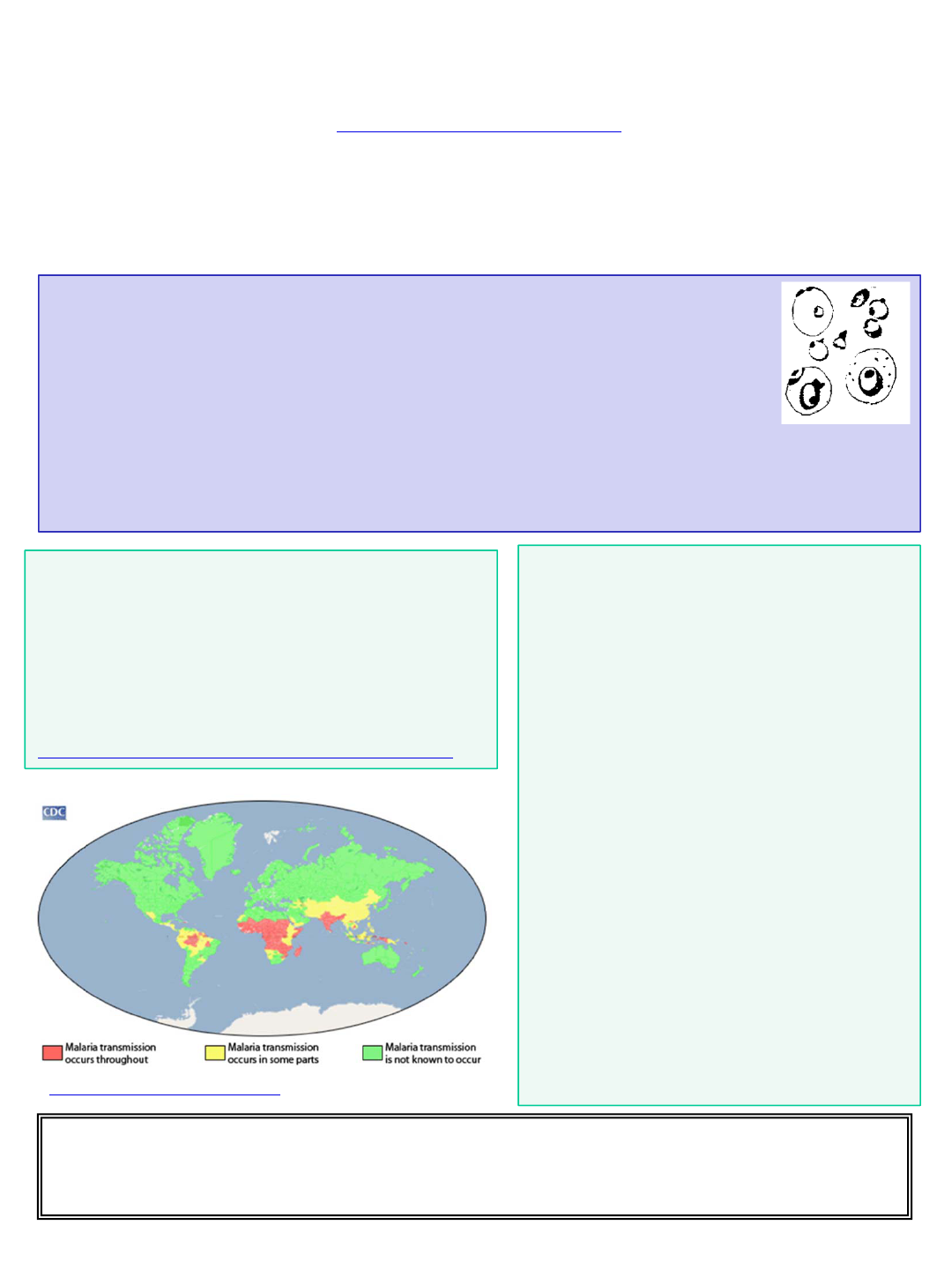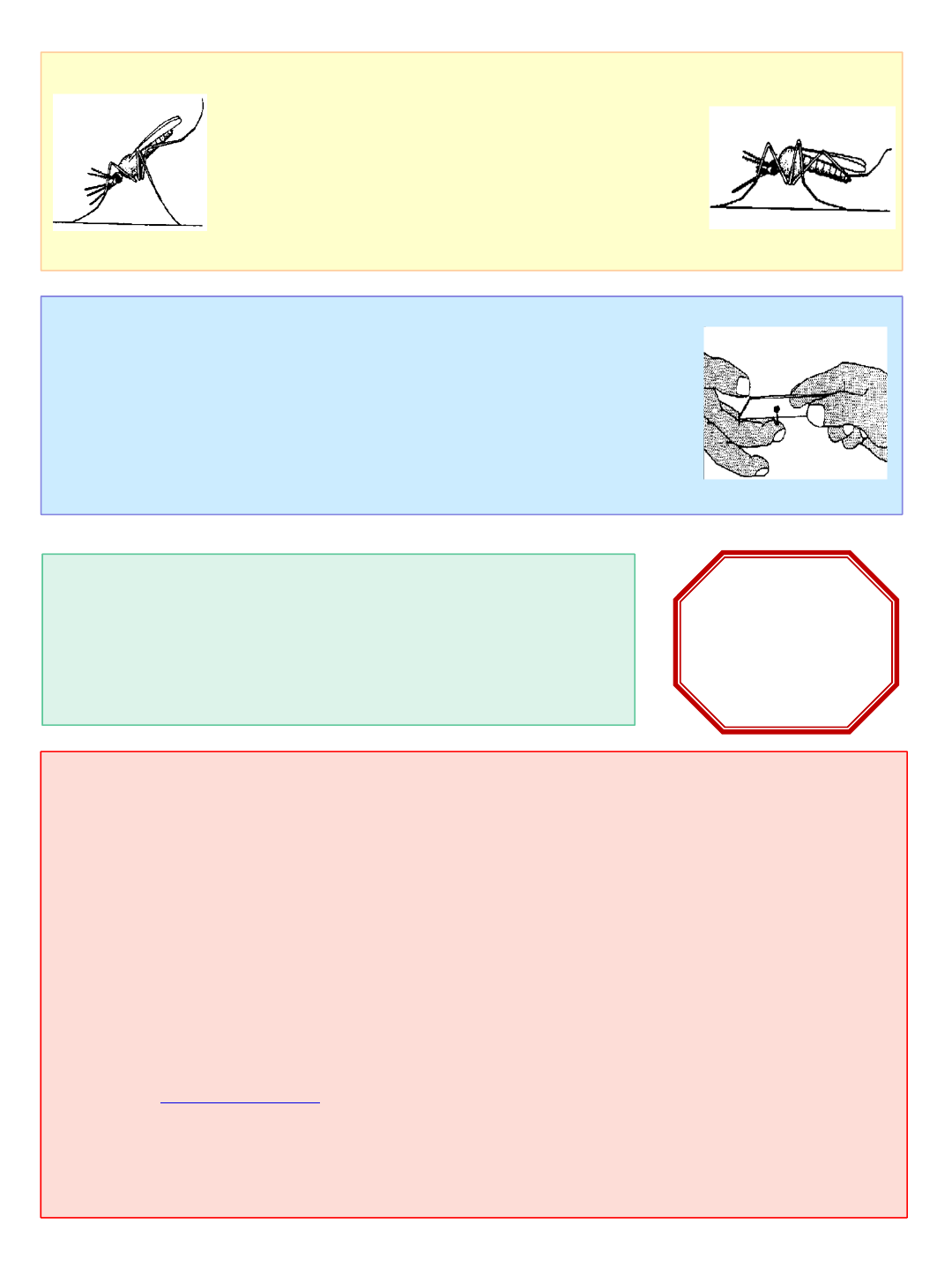
NO BITE, NO MALARIA
What is Malaria?
Malaria is a disease caused by a parasite that multiplies in your red blood cells.
It is spread by certain types of mosquitoes. Main symptoms include fever, chills
and cold-sweats.
Is it serious?
Yes! If you never had malaria before, your body has no immunity. Anyone can get Malaria. Most
people get sick, and some even die. The World Health Organization estimates that in 2010 there
were over 216 million cases worldwide with 655,000 people dying of Malaria, most of them
children in Africa
How do I know if I have
Malaria?
If you stayed in an area with Malaria and
you have a high fever, suspect Malaria.
• Symptoms typically appear 7 to 9 days
after infection
• Malaria begins with flu-like symptoms:
aches, fatigue
• Most people will then experience an
attack: chills, fever, thirst, sweating, skin
feels hot
• Your temperature may reach 102Fto
104F
• After an attack, you may feel tired and
fall asleep
There are other causes of fever. Not all
fevers are due to Malaria. Malaria shares
many symptoms with the common flu. See
a doctor if you have been in a Malaria-
infected region, if your fever persists, or if
you are unsure.
STAY IN MALARIA AREA + UNEXPLAINED FEVER
THINK MALARIA
Where does Malaria occur?
Malaria occurs worldwide mostly in hot, tropical
environments. About 1,500 American travelers are
diagnosed each year with Malaria. The Centers for
Disease Control and Prevention (CDC) has a list of
countries where Malaria occurs with the
recommended antimalarial drug for each country at:
http://www.cdc.gov/malaria/travelers/country_table/a.html
http://cdc-malaria.ncsa.uiuc.edu/
Louisiana Office of Public Health
Infectious Disease Epidemiology Section
Phone: 1-800-256-2748
www.infectiousdisease.dhh.louisiana.gov
Page 1 of 2

How do I get Malaria?
The Malaria parasite is carried by Anopheles
mosquitoes. You become infected by being bit by
an Anopheles mosquito carrying Malaria. You can
recognize the Anopheles when they bite because
they stand straight up while other mosquitoes stand
parallel to the skin.
NO BITE
NO MALARIA
How is it diagnosed?
To find the Malaria parasite, the doctor will take some blood from your
finger tip or the vein. Remember, you should only be stuck with a new
and disposable sharp. The blood will be thinly spread on the slide and
be looked at under the microscope. If it is negative, you probably do not
have malaria. If your fever persists and you have been in a Malaria-infected
area, you can ask your doctor to re-test.
Anopheles biting Other mosquito biting
Prevention
• Avoid being bit by Anopheles mosquitoes.
• Anopheles bite in the evening (6-10 PM) and
the early morning (3-5 AM). Wear long
sleeves, long pants and covered shoes during
these times.
• Apply insect repellent on exposed areas. Use
insect repellent that contains DEET. Follow
product instructions. For more information
regarding pest control and insect repellent,
visit the National Pesticide Information
Center at http://npic.orst.edu
• Use screens on doors and windows to prevent
mosquitoes from entering.
• Sleep under a mosquito net if you sleep
outside
• Outside devices like mosquito coils and
citronella candles do not offer enough
protection from mosquito bites to prevent
Malaria.
• When traveling outside the United States to a
Malaria-infected country, ask your doctor for
a prescription for antimalarial drugs four to
six weeks before you leave. Take these as
prescribed on your trip.
What if I’m pregnant?
Infected mothers can pass the parasite on to their babies in-utero
or during childbirth. Although this is rare, health-care providers
should be notified if the pregnant mother has been in Malaria-
infected areas, especially if the baby has a fever or if the baby has
been diagnosed with Malaria.
Page 2 of 2
